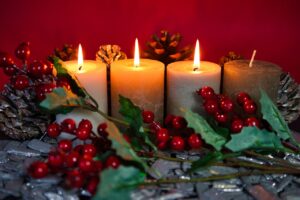Job 38:1-4, 8-11 (RM) or 1-11 (RCL); Psalm 107; 2 Corinthians 5:14-17 (RM) or 2 Corinthians 6:1-13 (RCL); Mark 4:35-41.
In 1968, the university where I did my doctoral studies in theology, the Catholic University of Leuven (or Louvain), Belgium, introduced English-language programs in the faculties of Theology and Philosophy. This meant that some of the Flemish professors needed to brush up on their English skills for teaching. When I arrived in Leuven in 1985 a few of them were still doing so.
One day, some of our friends in Philosophy came from class with a funny story. The professor had stood before the lecture hall, eyes bulging, arms spread and gesticulating dramatically like a silent-screen star, as he sonorously proclaimed,
“In the beginning …there was… cows.
Nothing — But — Cows.
ONLY. COWS.”
Of course the students paused and glanced at each other, puzzled. The prof kept going on about cows. Finally, one student raised her hand (keep in mind, it was still not customary here for students to interrupt a university lecture with questions) and hesitantly asked, “Professor, could you write that on the board for us?”
The professor graciously complied. He took the chalk and wrote, “C-H-A-O-S.”
If the underlying theme of our First Reading and Gospel for today had been about primeval cosmic moo-cows it would be a lot more fun to write about. Instead it will take us to a disturbing place in the history of religions that bears on our present and our future.
In the first reading God, speaking from a whirlwind, cuts through Job’s whining and self-pity to say
“Where were you when I made the earth? Who laid out its measurements? Who shut the sea within doors when it burst forth from the womb… and set limits for it, and set bars and doors?”
This God is master of the universe, who creates out of watery chaos and sets structures in place to hold back what is wild and uncontrollable. This is not the only ancient story about a great Lord God defeating the powerful waters, or even binding a rival sea-god.
The Babylonian creation story relates that the hero Marduk takes up the sword against the sea monster Tiamat, the powerful mother-God, and not only defeats her but cuts up her body to use as material to create the earth and its creatures. This example of ancient myth depicts the primordial chaos as female, as mighty and thunderous waters — amniotic waters — that the male hero must defeat and destroy in order to create, control and dominate all that is.
In the Gospel reading Jesus, at an early stage in his public ministry, is depicted doing what God, the patriarchal Lord of the universe, does: giving orders to the threatening waters and subduing them. In the words of New Testament scholar Gerard Sloyan, “Jesus’ power over wind and wave is part of a larger confrontation basic to Mark’s Gospel in which Jesus takes on the cosmic powers of evil, replacing chaos and death with divine order and life.”
So – we worship the primordial male who defeats and slays the primordial female?
Farfetched? “Who shut the sea…when it burst forth from the womb?” is a dead giveaway. This is both primeval amniotic fluid, and world-threatening flood.
We could pursue a commentary on the persistence of a war on women. But for now, let’s disengage the binary sex dichotomy and just face our fear of chaos.
We know all too well the chaos, destruction, and sudden terror of a flash flood. They happen all over the earth, in cities and rural areas, with and without warning. And we know we can’t just write this off as random ontic evil (evil that just is) because it’s directly caused by human despoliation of the environment and industry-induced climate change. And by lifestyle.
It’s in our hands now. How much hard work would it take to confront the chaos?
© Susan K. Roll
This is an edited version of the Reflection from June 20, 2021.
Susan Roll retired from the Faculty of Theology at Saint Paul University, Ottawa, in 2018, where she served as Director of the Sophia Research Centre. Her research and publications are centred in the fields of liturgy, sacraments, and feminist theology. She holds a Ph.D. from the Catholic University of Leuven (Louvain), Belgium, and has been involved with international academic societies in liturgy and theology, as well as university chaplaincy, Indigenous ministry and church reform projects.




